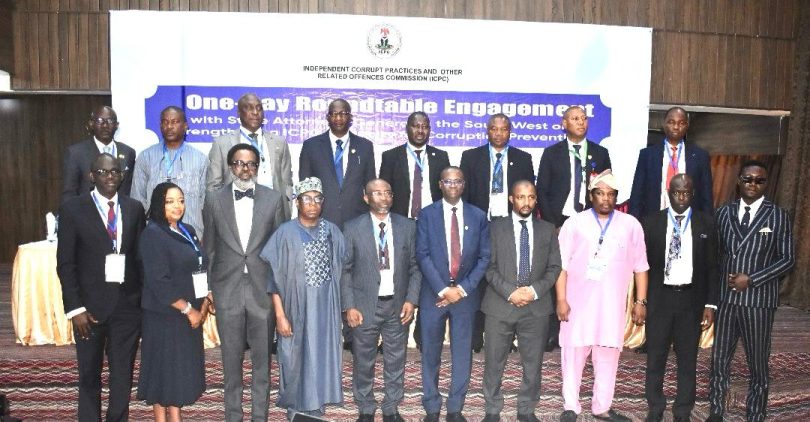State Attorneys-General from the six South-West states have committed to adopting uniform prosecutorial guidelines and digital case-tracking systems to combat corruption, as the Independent Corrupt Practices and Other Related Offences Commission (ICPC) concluded its nationwide zonal engagements in Akure, Ondo State.
The engagement, themed “Institutional Integrity and Regional Cooperation: The Role of Attorneys-General in Advancing a Corruption-Free South-West” brought together Attorneys-General from Lagos, Ogun, Oyo, Osun, Ondo, and Ekiti States.
In his welcome address, the Chairman of ICPC, Dr. Musa Adamu Aliyu, SAN, stated that the South-West engagement marked the final phase of a historic consultative process that began in Abuja on 9th September 2024 and subsequently held across Kano, Asaba, Ilorin, Enugu, and Maiduguri.
Dr. Aliyu observed that the dialogues were designed to strengthen the rule of law as the most effective mechanism for preventing corruption and ensuring good governance. He underscored the need for Attorneys-General to remain vanguards of justice and defenders of Nigeria’s federal system, particularly in light of recent judicial pronouncements on local government autonomy.
The ICPC Chairman further highlighted the Commission’s ongoing efforts to deepen accountability at the grassroots through the Accountability and Corruption Prevention Programme for Local Governments (ACPP-LG), implemented in collaboration with the European Union, International IDEA, the Centre for Fiscal Transparency and Public Integrity Network, the Code of Conduct Bureau (CCB), the Bureau of Public Procurement, and the Fiscal Responsibility Commission.
The engagement received strong institutional backing from key stakeholders. Goodwill messages were received from the Chairman of the Senate Committee on Anti-Corruption and Financial Crimes, Distinguished Senator Emmanuel Memga Udende, and the Chairman of the House of Representatives Committee on Anti-Corruption, Hon. Prince Kayode Moshood Akiolu, where they commended the Commission for sustaining inter-governmental dialogue and pledged legislative backing for the outcomes of the engagement.
The Chief Judge of Ondo State, Hon. Justice Aiyedun Olusegun Odusola, represented by the Director-General, Ondo Multi-Door Courthouse, Dr. Dickson Ogunfuyi, also delivered goodwill remarks, commending ICPC for its institutional capacity and unwavering commitment to accountability, transparency and reform.
Describing the engagement as “timely and relevant,” Dr. Ogunfuyi noted that corruption remains both a moral and institutional threat, stressing that through institutional integrity and regional cooperation, “Nigeria can build a nation where justice truly reigns.”
Declaring the event open, the Special Guest of Honour and Chairman of the Code of Conduct Bureau (CCB), Dr. Abdullahi Usman Bello, commended ICPC’s collaborative strategy in promoting ethical governance and institutional transparency. He reaffirmed the Bureau’s readiness to work closely with ICPC in strengthening compliance with codes of conduct and public integrity standards.
Following the formal opening, the keynote address, titled “Politics and the Office of the Attorney-General: Why Independence Matters in the Fight Against Corruption,” was delivered by Mr. Moyosore Jubril Onigbanjo, SAN, FCIArb, former Attorney-General and Commissioner for Justice of Lagos State, who examined the complex interplay between politics and the law in governance.
He stressed that the Attorney-General’s office is both “the guardian of legality and a participant in the political process,” making its independence vital to the integrity of justice administration.
Mr. Onigbanjo said that while Sections 174 and 211 of the 1999 Constitution (as amended) grant wide prosecutorial discretion, institutional safeguards remain weak, thereby leaving the office vulnerable to external pressures.
He cited lessons from Nigeria and other jurisdictions, and went on to charge Attorneys-General to demonstrate courage and ethical consistency, insisting that “the fight against corruption is not won only in courtrooms but in the quiet decisions of those entrusted with power.”
He advocated statutory and administrative reforms to reinforce the autonomy of the office, enhance transparency, and strengthen its role as a moral compass in governance.
The engagement featured an interactive session anchored by the ICPC Chairman, Dr. Musa Adamu Aliyu, SAN, during which the State Attorneys-General made presentations and engaged in peer exchanges on practical challenges within their jurisdictions.
Key issues highlighted included overlapping mandates between state and federal anti-corruption agencies, evidentiary constraints in prosecuting politically-exposed persons, and significant delays in judicial processes.
One Attorney-General cited a recent case where a lack of inter-state coordination allowed a suspect to evade arrest.
Participants emphasized the need for harmonising prosecutorial processes, strengthening inter-agency collaboration, and institutionalising preventive measures at the sub-national level, while collectively underscoring the importance of continuous capacity building, digital integration in justice administration, and sustained cooperation with ICPC to entrench integrity across governance systems.
Commenting on the resolutions, Mrs. Stella Adegoke, Director, Civil Advisory Department, Ondo State Ministry of Justice, who represented the Attorney-General and Commissioner for Justice of Ondo State, Dr. Olukayode Ajulo, SAN, OON, FCIArb, stated: “These commitments represent more than pledges, they are practical tools we will deploy immediately. The digital case-tracking system alone will revolutionize how we monitor corruption prosecutions across state lines.”
At the conclusion of deliberations, participants unanimously adopted a comprehensive communiqué outlining strategic resolutions and commitments to enhance interstate collaboration, standardise legal frameworks, and promote intelligence sharing and capacity building for legal officers.
In his closing remarks, the Chairman of ICPC, Dr. Musa Adamu Aliyu, SAN, commended the active participation of the State Attorneys-General and acknowledged the depth of insights shared during the technical session.
He reaffirmed the Commission’s readiness to act on the recommendations and resolutions of the engagement, noting that such inter-governmental collaboration remains critical to strengthening preventive systems nationwide.
Dr. Aliyu assured that ICPC would continue to build institutional partnerships that enhance transparency, accountability, and the rule of law across all levels of government.

